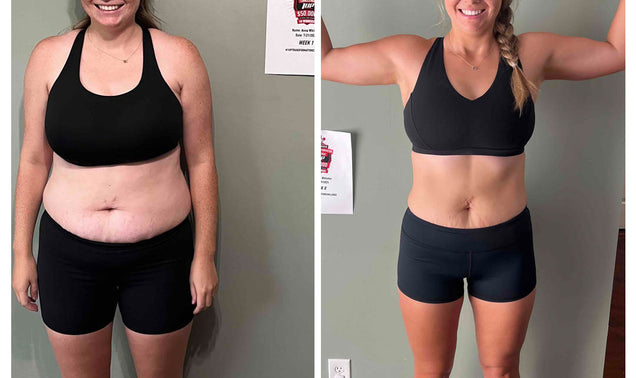Nutrient timing entails the targeted intake of nutrients (most often protein and/or carbohydrate) in and around the workout window.
But, there are other times when it may be beneficial (and even necessary) to consider prioritizing the intake of certain nutrients.
One such instance is carb loading.
Today, we discuss what carb loading is, who should consider using it, and when is (and is not) the right time to carb load.
Let’s get started!
What is Carb Loading?
Carbohydrates are one of the three main macronutrients which we supply our cells with energy. The other two macronutrients, as you likely know, are protein and fat.
The reason so much chatter surrounds the timing of carbohydrates around and during the workout is thatglucose is the primary form of energy used by cells to power high intensity exercise.
Fatty acids and amino acids can be used to fuel exercise performance, but it’s not the body’s preferred option, especially when doing very intense training like strength training or high intensity interval training.
Furthermore, the oxidation (“burning”) of fatty acids or amino acids for energy is substantially slower (read: less efficient) compared to glucose metabolism. This translates to decrements in your top end performance.
Seeing as carbohydrate is what supplies the body with energy and powers high-intensity efforts, it stands to reason that consuming carbohydrates in the peri-workout window makes sense.
Carb loading is the practice of attempting to increase glycogen storage in your muscles above and beyond its typical daily content.[1]
The practice typically entails eating more carbs than you normally do in the days leading up to a big athletic competition or performance (such as a marathon or day long soccer tournament). Individuals following carb loading also reduce the amount of exercise they are performing so as to decrease the amount of carbohydrate and glycogen that is used by the body.
When Should I Carb Load?
Suffice it to say that like most things in life, there are certain situations where you should carb load and certain situations that don’t really require it.
In other words, carb loading is really only useful (i.e. improves performance and fatigue resistance) for certain types and durations of physical activity.
More specifically, carb loading is most beneficial for activities that require large amounts of glycogen, such as endurance running or biking.[2,3]
Since carbohydrate fuels exercise performance, and sustained physical exertion relies primarily on carbohydrates, when glycogen (carbohydrate) levels become depleted, fatigue sets in and performance sharply declines.
In other words, the longer and higher intensity your activity is, the greater demand there is for carbohydrate before, during, and after exercise.
So, for instance, if you are an endurance athlete training or competing for multiple hours at a time (and you want to perform well), then carb loading makes sense for you. You should consume carbs in the days and hours leading up to your session. Depending on how long your training bout or competition lasts, you may need to ingest some intra workout carbohydrates as well.
However, there are instances when you do not need to load up on a bunch of carbohydrates, which brings us to the next point...
When Should I Not Carb Load?
Carb loading is most appropriate for activities that are long-lasting and glycogen depleting.
If your training session is not very long and/or not very glycogen dependent, then you do not need to bother with carb loading.
For instance, if you perform slow, steady-state cardio for 30 minutes each morning, or go for a nice, lengthy leisurely walk during the day, you do not need to carb load.
Low intensity exercise if fueled primarily by fatty acids since the demand of ATP required by your muscles is fulfilled by the slower oxidation rate of fatty acids. In other words, the body is smart enough to save its rocket fuel (carbohydrates and glycogen) for the high intensity stuff like sprinting or weight lifting.
Now, something else to consider is how well you respond to ingesting carbohydrates in the hours leading up to a training session.
If you feel sluggish, tired, or “slow” after eating a huge bolus of carbohydrates leading up to a workout, then either don’t have the carbs at all or consume a smaller quantity. You could also try experimenting with a different source of carbohydrates (oatmeal vs white rice vs bread).
Not all workouts require carbohydrates -- the longer ones and the higher intensity ones do.
If you’re just going for a stroll around the block or doing 30 minutes of light circuit training, you don’t really need to be concerned with carb loading or even consuming carbs in the 1-2 hours before training.
Your body has ample glycogen and energy stores to fuel your workout.
How Many Carbs Should I Eat Before Training?
This is entirely dependent on how long you are training and how intensely you are working during that session.
As we mentioned earlier, for a lower intensity cardio workout or even a low volume resistance training routine, you are probably fine not carb loading (though you can do so if it makes you feel like you can have a better workout).
Research indicates that consuming 1.5g carbohydrate per kilogram of bodyweight before completing 90 minutes of intense exercise leads to greater performance and less perceived fatigue than have little to no carbs.[4]
Other studies indicate that performance can increase between 2-3% for exercise bouts lasting longer than 90 minutes when carb loading.[5]
As we already mentioned, for short duration exercise, there does not appear to be much benefit to carb loading.[5,6,7]
The reason for this is simple, the duration is not long enough to deplete glycogen levels so much that you “bonk” or hit a wall. This includes resistance training workouts where you are performing a relatively low total volume of work.
For moderate to higher volume resistance training sessions, having a high carb meal 1-2 hours before training can help ensure there is enough blood glucose to support the increased workload as well as shore up and shortcomings in glycogen storage.
Carbs before training also help keep insulin levels elevated, which keeps cortisol levels lower. Remember, cortisol is a catabolic hormone that can cause protein breakdown.
If you’re engaging in prolonged exercise (multi-hour training sessions -- marathon, triathlon, etc.), it definitely is a good idea to have some carbs prior to training as well as the days leading up to your training session, especially if you perform several multi-hour training bouts per week.
In addition to having a high carb meal before (and/or after) training, you may also benefit from a carbohydrate supplement.
Many times we don’t have the time or patience to cook a meal before training. Other times, the food is too slow digesting, which can leave you feeling slow or slightly nauseous.
In times like this, it helps to have a quick-digesting carb supplement that energizes and boosts performance without wreaking havoc on blood sugar and insulin levels or irritating your stomach.
Our preferred carb supplement is 1UP Tri-Carb.
Tri-Carb is an advanced performance and recovery supplemented fueled by a trio of scientifically-backed carbohydrates, including:
- 15 grams Cluster Dextrin
- 8 grams Carb10
- 2 grams ModCarb
Each serving of Tri-Carb is also fortified with Insulin Modulators and Electrolytes to facilitate rapid nutrient uptake and promote hydration.
Tri-Carb is extremely versatile and can be used pre workout, intra workout, or post workout.
How to Use Tri-Carb
Pre-Workout:
To support energy, hydration, performance, and pumps, consume 1-2 servings of Tri-Carb 30 minutes prior to training.
Intra-Workout:
To sustain performance, intensity, muscle pumps, and energy production during intense training sessions, consume 1-2 servings of Tri-Carb.
Post-Workout:
To accelerate recovery and glycogen replenishment as well as facilitate muscle growth, drink Tri-Carb immediately following intense training mixed with one serving of 1UP ISO or 1UP Whey Protein
Protein is a macronutrient that is essential for recovery and muscle building. Protein Shake is a very convenient and a fast way to get your protein in. Drink it immediately post workout to start the recovery process. Also helps with sweet cravings while dieting.
MAIN BENEFITS
- Promotes Lean Muscle Growth.
- Supports Muscle Recovery
- Improves Strength.
References
- Jeukendrup AE. Nutrition for endurance sports: marathon, triathlon, and road cycling. J Sports Sci. 2011;29 Suppl 1:S91‐S99. doi:10.1080/02640414.2011.610348
- Bergström J, Hermansen L, Hultman E, Saltin B. Diet, muscle glycogen and physical performance. Acta Physiol Scand. 1967;71(2):140‐150. doi:10.1111/j.1748-1716.1967.tb03720.x
- Sullo A, Monda M, Brizzi G, et al. The effect of a carbohydrate loading on running performance during a 25-km treadmill time trial by level of aerobic capacity in athletes. Eur Rev Med Pharmacol Sci. 1998;2(5-6):195‐202.
- Khong, T. K., Selvanayagam, V. S., Hamzah, S. H., & Yusof, A. (2018). Effect of quantity and quality of pre-exercise carbohydrate meals on central fatigue. Journal of Applied Physiology, 125(4), 1021–1029. https://doi.org/10.1152/japplphysiol.00221.2018
- Hawley JA, Schabort EJ, Noakes TD, Dennis SC. Carbohydrate-loading and exercise performance. An update. Sports Med. 1997;24(2):73‐81. doi:10.2165/00007256-199724020-00001
- Sherman WM, Costill DL, Fink WJ, Miller JM. Effect of exercise-diet manipulation on muscle glycogen and its subsequent utilization during performance. Int J Sports Med. 1981;2(2):114‐118. doi:10.1055/s-2008-1034594
- Escobar KA, VanDusseldorp TA, Kerksick CM. Carbohydrate intake and resistance-based exercise: are current recommendations reflective of actual need?. Br J Nutr. 2016;116(12):2053‐2065. doi:10.1017/S0007114516003949






